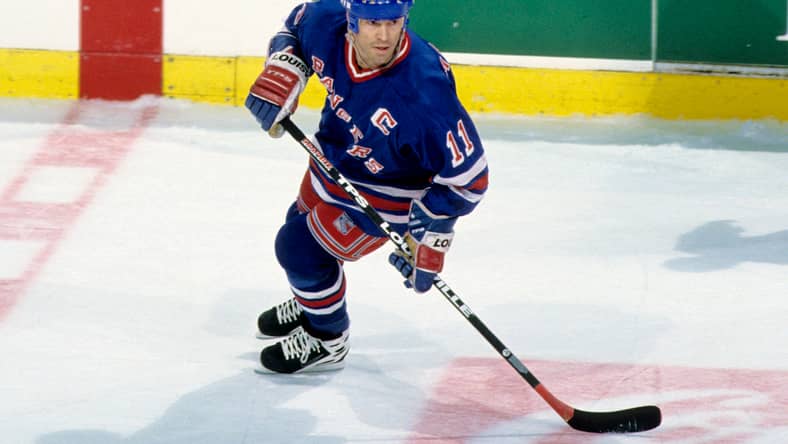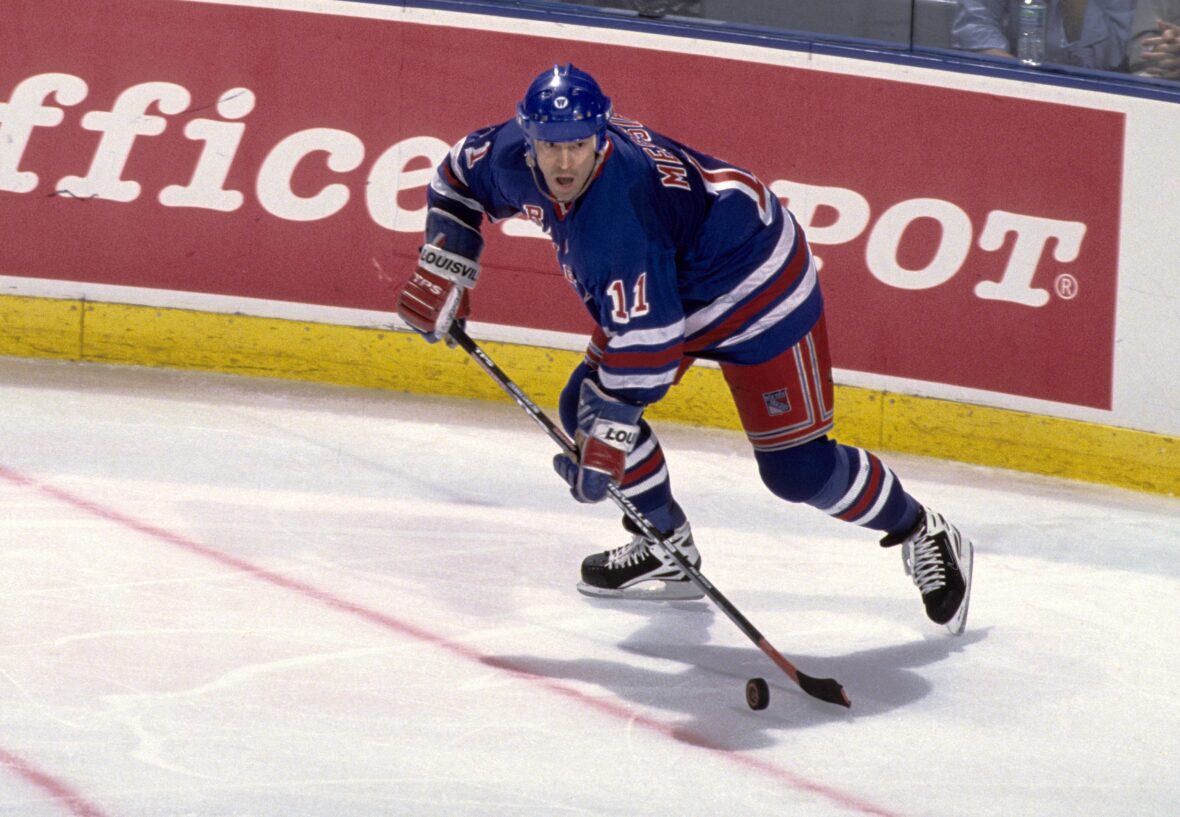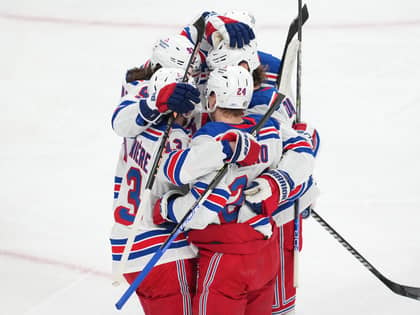Rangers Greatest Hits: Mark Messier’s Hart Trophy campaign in 1991-92

Mark Messier remains the only player in NHL history to captain two different franchises to a Stanley Cup championship, achieving the feat in 1990 with the Edmonton Oilers and in 1994 with the New York Rangers. By the time “The Moose” came to Broadway in 1991, he was already a five-time champion, a one-time Hart Trophy winner, and a playoff MVP with the Oilers.
Despite skating in Wayne Gretzky’s shadow for most of the 1980s, Messier proved to the hockey world he was one of the game’s best players by winning without his former teammate. Then, to further cement his legacy as one of his generation’s greatest, he came to New York and, by the end of his first campaign in a Rangers’ uniform, almost broke the team’s all-time scoring record. Furthermore, he became just the fourth player in team history to win the Hart Trophy and remains the last one as of 2023.
Statistically, Messier scored a career-high 129 points in 1989-90, breaking his previous best of 111 points from 1987-88. However, the last time he reached 100 occurred in 1991-92, when he captured the Hart Trophy and led the Rangers to their first Presidents’ Trophy win.
So, let’s revisit Messier’s 1991-92 season and see how individual success powered an entire team to the top of the standings.
Mark Messier shines in the opening months
At the start of the season, New York didn’t take the league by storm, producing just a 9-5-0 record, outscoring opponents 50-46 in October. Meanwhile, Messier, who missed a game that month, tallied 18 points (five goals and 13 assists) to finish with a plus-seven rating and 22 penalty minutes.
Despite collecting just 15 points in 12 games in November, he was piling up the assists with a total of 24 through the first two months. Additionally, Messier had 33 points in 25 games, good enough for a 1.32 points-per-game (PPG) average. However, the Rangers struggled, going 6-5-1 that month, earning a 15-10-1 record through 26 games, barely beating opponents on the scoreboard 85-81.
Heading into the holiday season, Messier collected more assists and padded his point totals, reaching double digits in each category for the third straight month. By the end of the calendar year, he had 52 points in 39 games, with 18 goals and 34 assists. Statistically, by this point, he was on pace to challenge Jean Ratelle’s club record of 109 points, set back in 1971-72, despite spending 54 minutes in the penalty box.
Meanwhile, the Rangers finished the month with a 10-4-0 record, collecting a seven-game win streak from December 13 to December 26. Finally, the team was dominating opponents and setting themselves up for a successful second half with a 25-14-1 record in 40 games, winning the scoreboard battle 152-129.
Messier and New York chased down franchise records in the second half of 1991-92

Despite the success at the end of 1991, the Rangers alternated wins and losses to start January, finishing the month with an 8-3-1 record. Moreover, Messier continued to produce with a 1.33 PPG average, collecting 16 points in 12 games, thanks to five goals and 11 assists.
As the calendar flipped to February, the Rangers captain scored almost every game, reaching a single-month high of 1.41 PPG with 17 points in 12 contests. Ultimately, Messier continued to power the Rangers offense, which led to a 7-3-2 record in the month, good enough for a 40-20-4 record after 64 games.
Although Messier skated in 14 games in March, he played in only two contests in April because of the brief NHL player’s strike, which lasted ten days and severely damaged his pursuit of Ratelle’s record of 109 points. However, in his final 16 games, he tallied 22 points with six lamplighters and 16 assists. Interestingly, he finished that stretch with a minus-two rating, the only time he did not register a plus rating during the campaign.
Overall, in 79 games, he finished with 107 points (1.35 PPG) thanks to 35 goals and 72 assists. Additionally, he was plus-31 with 79 penalty minutes and six game-winners.
Meanwhile, as the Rangers chased their first Presidents’ Trophy win, they finished strong with an 11-5-1 record, almost doubling up opponents with 76 goals scored compared to 42 against. Statistically, the club finished with 105 points (50-25-5), becoming the only team in the league to surpass 100 points. However, their regular season success did not carry over into the playoffs with a second-round loss to the Pittsburgh Penguins in six games.
Although Messier came within two points of setting a new Rangers scoring record in the regular season, he only had 14 points in 11 playoff games (seven goals and seven assists) while finishing the postseason as a minus-four.
Inside the numbers of Messier’s Hart Trophy season
Surprisingly, despite collecting 107 points, Messier finished fifth in the scoring race behind Mario Lemieux (131), Kevin Stevens (123), Gretzky (121), and Brett Hull (109) while tying Luc Robitaille (107). Although he had 35 goals, he didn’t even crack the top 20 in that category before finishing with the sixth most assists (72). Additionally, he was only one of nine players to finish the year with a plus/minus rating over 30 (plus-31).
Additionally, Messier was neck and neck with Brian Leetch for the team scoring lead, with the eventual Norris Trophy winner collecting 102 points and setting a franchise record with 80 assists. Ultimately, the pair combined for 207 points, which accounted for 24.5% of the Rangers scoring totals (852 points).
Statistically, Messier collected three hat tricks in the regular season, with a four-goal game against the New Jersey Devils on March 22. Before the holiday break, he had three-goal games against the Vancouver Canucks (November 19) and the Washington Capitals (December 13). Furthermore, he had three four-point contests and nine three-point matches.
Overall, Messier registered a point in 64 of the 79 games he skated in and was a shocking minus-13 in contests he failed to earn a point. Surprisingly, in a game against the Buffalo Sabres (October 14), he still had two assists while earning ten penalty minutes, which was a season-high.
Although he came within two points of tying the franchise record (at the time), Messier skated in 16 more games than Ratelle did in 1971-72. Realistically, if Messier had a chance to play in all 82 games, he would have broken the record by a single point, based on his final 1.35 PPG average that season.
What happened to Messier after the 1991-92 season?
Historically, after capturing the Hart Trophy in 1991-92 for a second time, Messier would eventually cement his status as the game’s greatest leader with a guaranteed playoff win in 1994 and then hoisting the Stanley Cup a few weeks later. Besides scoring the clinching goal in Game 7 of the Stanley Cup Final, he helped the Rangers end a 54-year championship drought in one of the game’s most memorable playoff runs.
Surprisingly, he reunited with Gretzky on Broadway when “The Great One” came to town in 1997. However, the reunion tour was short-lived, lasting only a single season before Messier opted to sign with the Canucks as a free agent in 1998. Eventually, after three seasons in Western Canada, he returned to the Rangers, retiring in 2004.
Collectively, the Hall of Famer (class of 2007) was a 16-time All-Star and six-time Stanley Cup winner. Additionally, he was a playoff MVP (Conn Smythe Trophy) and two-time winner of the Hart Trophy and Lester B. Pearson Award. Furthermore, Messier was the second-highest scorer (1,887 points) in league history upon retiring, dropping to third place when Jaromír Jágr passed him in 2015-16.
Overall, whenever people discuss Messier’s legacy, it is evident that his best statistical campaigns occurred with the Oil. Still, he became a hockey legend in New York with many heroic accomplishments. Ultimately, an entire generation of Rangers fans got to share in one of the most glorious runs in team history, thanks to a man whose #11 jersey hangs in the rafters of Madison Square Garden.
More About:New York Rangers Features

